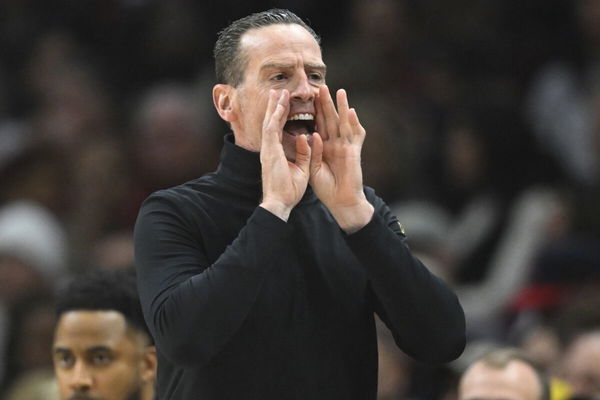
via Imago
Nov 8, 2024; Cleveland, Ohio, USA; Cleveland Cavaliers head coach Kenny Atkinson reacts in the first quarter against the Golden State Warriors at Rocket Mortgage FieldHouse. Mandatory Credit: David Richard-Imagn Images

via Imago
Nov 8, 2024; Cleveland, Ohio, USA; Cleveland Cavaliers head coach Kenny Atkinson reacts in the first quarter against the Golden State Warriors at Rocket Mortgage FieldHouse. Mandatory Credit: David Richard-Imagn Images
Let’s be real—if Kenny Atkinson had a playoff checklist, “collapse in the final regular-season game” wasn’t on it. But that’s exactly what happened. The Cleveland Cavaliers blew a 23-point lead against the Indiana Pacers (118-126) and faceplanted into their own reflection, just days before the postseason. Yet somehow, the loss said less about the scoreboard and more about the scoreboard operator—the one managing rotations, legs, and expectations.
Because yes, the Cavs are the No. 1 seed in the East. Yes, they’ve got home-court advantage. And yes, they’re entering the playoffs healthy. But the body may be ready while the mind still wants a do-over. So yes, this was a loss. But it was also a mirror. And when Atkinson looked into it, he didn’t like what he saw.
Here’s what surprised him: the emotional aftermath wasn’t all doom; it was something closer to calm. “I think we’re in a great place,” Atkinson said. “Physically, mentally—I feel like we’re in a really solid spot.”
ADVERTISEMENT
Article continues below this ad
It was a quiet confidence that said more than the score. A team that had just blown a lead wasn’t shaken. They were focused. Grounded. “We’ve taken a good step forward,” Atkinson added. “But now? Now it’s about going from good to great.”
Still, it didn’t look that way by the final buzzer. Against the Pacers, Atkinson let his reserves play through the entire second half. He saw fatigue. He kept them in any way. Cleveland went 8-for-39 from three after halftime, the ball stopped moving, and defensive intensity waned. It wasn’t just a flat second half—it was a team running on empty.
Only later did Atkinson admit the obvious: “There’s a little regret on my part—not getting those guys, especially the reserves, some rest. I kept them in the whole time. I think they ran out of gas”
That regret wasn’t just tactical—it felt emotional. This wasn’t a seasoned coach playing chess. This was a first-year head coach walking through his final regular-season game like a lab experiment. Atkinson, who’s coached in the playoffs before as an assistant but never as the lead man, admitted he “wanted to see if they could fight through it.”
Translation: he was testing his guys. But maybe he was also testing himself. Would his philosophy hold under pressure? Could he trust his read of the room, of the rhythm, of their legs? And that’s where the other layer of guilt creeps in.
It wasn’t just that the Cavaliers lost. It’s that one of their most promising young players—Emoni Bates—delivered a strong performance that was ultimately swallowed by the collapse. “Emoni’s improved,” Atkinson said. “He’s gotten better since the start of the season.” The rookie’s rhythm and shot-making have become vital tools off the bench, especially after his early-season injury.
What’s your perspective on:
Can the Cavaliers' mental toughness match their physical readiness in the high-stakes playoff environment?
Have an interesting take?
Now the question becomes: What does he see going forward?
The Cavs Are Studying for a Test Without Knowing the Questions
The Cavaliers won’t know their first-round opponent until the play-in tournament wraps. That means an entire week of watching, waiting, and—most importantly—preparing for everything.
It’s not ideal. There’s no singular game plan to drill. No scouting report to obsess over. And for a young team led by a rookie head coach, that ambiguity could be either a gift or a trap.
But here’s the good news: the Cavaliers have been here before—at least, emotionally. During a four-game losing streak earlier in the season, it was Donovan Mitchell who leaned into the adversity. “He’ll say things like, ‘Hey, maybe we can use this in end-of-game situations,’ or ‘Should we take this out of our playbook?’” Atkinson revealed. “The dialogue increases.”

via Imago
Feb 20, 2025; Brooklyn, New York, USA; Cleveland Cavaliers guards Darius Garland (10) and Donovan Mitchell (45) react during the second half against the Brooklyn Nets at Barclays Center. Mandatory Credit: John Jones-Imagn Images
That problem-solving mode, where losses force growth, is exactly where the Cavaliers are again now. And according to Atkinson, they’re better for it.
“We’re hungry, man,” he said. “This group? They want it.”
ADVERTISEMENT
Article continues below this ad
They’re healthy. They’re top-seeded. And if they’ve learned anything from Game 82, it’s that physical freshness alone doesn’t carry you. Mental sharpness matters, too.
And that’s where Tristan Thompson comes in. His 20-rebound performance wasn’t just nostalgic—it was a warning shot to playoff opponents. “We’re going to need him—I know it,” Atkinson said. “There’s going to come a moment in the playoffs where we’re struggling to rebound the ball, and that’s when his physicality and experience are going to be crucial.”
Because once the playoffs begin, the only thing more dangerous than fatigue… is guessing wrong.
ADVERTISEMENT
Article continues below this ad
So if the Cavaliers are studying for a test without knowing the questions, they better hope they’ve prepared for every answer.
Stay tuned.
ADVERTISEMENT
ADVERTISEMENT
ADVERTISEMENT
ADVERTISEMENT


"Can the Cavaliers' mental toughness match their physical readiness in the high-stakes playoff environment?"